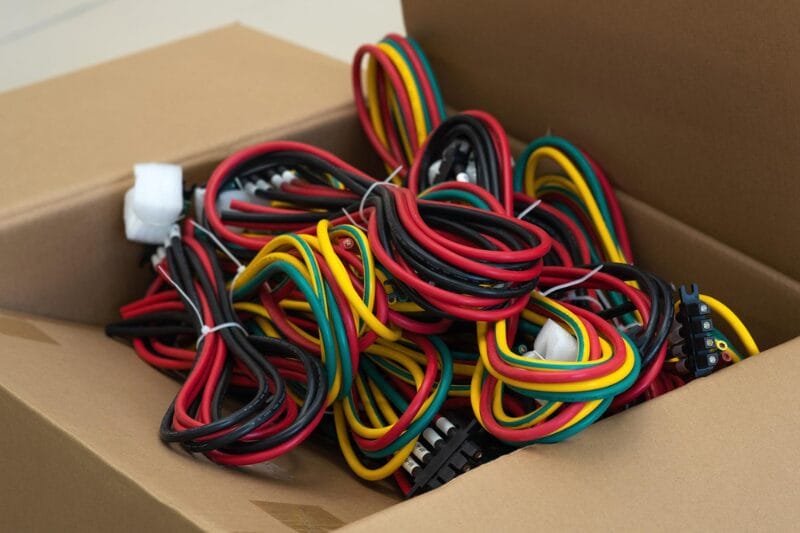We all have that drawer—the one packed with old wires, tangled cords, and obsolete charging cables. They’re easy to forget, but dumping them in the trash is a big mistake. These wires often contain metals like copper and coatings with toxic chemicals, making them a serious e-waste hazard.
So, how do you recycle wires responsibly? Whether it’s frayed power cords, Ethernet cables, or retired phone chargers, proper wire recycling keeps valuable materials out of landfills and reduces environmental harm.
With e-waste piling up at over 62 million tons globally each year, responsibly recycling these items is more important than ever.
In this guide, you’ll learn how to recycle cables, cords, and wires the right way. From drop-off locations and mail-in programs to prep tips and reuse ideas, we’ll help you handle electronic leftovers in the most sustainable way possible.
Key Takeaway: How to Recycle Wires
You can recycle old wires, cords, and cables at certified e-waste recyclers, electronics stores, community drop-off events, or through mail-in programs. Never throw them in the trash—they contain recyclable metals and toxic materials. Proper cable recycling reduces e-waste, protects the environment, and helps recover valuable resources like copper and aluminum.
Which Wires, Cords, and Cables Should Never Go in the Trash?
You should never throw away wires, cords, or cables that contain metal conductors, plastic insulation, or electronic connectors. These include power cords, USB cables, phone chargers, extension cords, and Ethernet cables. When tossed in the trash, they can release toxic chemicals and contribute to the growing e-waste crisis.
Most household wires are made with copper or aluminum, which are highly recyclable. The outer insulation is usually plastic, rubber, or PVC—materials that take decades to break down and can leach harmful substances into the environment when landfilled.
Here are some common wire types you should always recycle:
- Power cords for laptops, TVs, and appliances
- USB cables and charging cords for phones, tablets, and cameras
- Extension cords and multi-outlet strips
- HDMI, Ethernet, and audio-visual cables
- Old coaxial cables, printer cords, and power adapters
Many people assume these items can go in the regular trash once broken or outdated. But because they fall under e-waste, they must be handled through proper wire recycling programs or certified e-waste recyclers. Improper disposal contributes to landfills overflowing with toxic materials like lead, cadmium, and brominated flame retardants.
If it plugs in, powers something, or connects one device to another—don’t throw it in the garbage. Recycle it the right way to recover valuable materials and protect the planet.
Where Can You Recycle Old Wires, Cords, and Cables Near You?

When it comes to recycling wires and cables, there are more options than you might think, and some are conveniently close by. Many big-box stores, like Best Buy, have designated drop-off locations for e-waste, where you can safely dispose of old cables, chargers, and other electronics.
Local recycling centers are also great options and often accept a variety of wire types.
Certain times of the year are ideal for recycling too. Cities frequently host e-waste recycling events around Earth Day or during spring-cleaning seasons, making it easier than ever to clear out your old cables responsibly. If drop-offs aren’t convenient, some companies even offer mail-in recycling services that let you ship your cables directly for proper processing.
For a small added bonus, a few facilities even provide cash for recycled cables, allowing you to make a little extra while making a big difference. To find a reliable recycler nearby, be sure to check out the Green Directory for qualified e-waste recycling options in your area.
How to Prepare Wires, Cables, and Cords for Recycling
To recycle wires, cords, and cables properly, you should prepare them before drop-off. Sorting, bundling, and removing attachments helps e-waste facilities recycle materials safely and efficiently.
Follow these 3 quick steps to get your cables ready.
1. Sort Cables by Type
Start by separating cables into categories, such as power cords, chargers, extension cords, and computer cables. This helps recycling facilities sort and process them more efficiently, as different materials may need specific recycling methods.
2. Bundle Cables to Prevent Tangling
Once sorted, bundle cables of similar type together. You can use twist ties or rubber bands to keep them from tangling, making them easier for recycling workers to handle.
3. Remove Non-Recyclable Attachments
Some cords come with plastic clips or attachments that may not be recyclable. Removing these ahead of time (where possible) helps streamline the recycling process and avoids contaminating recyclable materials.
What to Do with Old Wires and Cables (Besides Recycling Them)
Before recycling your old cables and wires, see if they can be reused or repurposed around your home. Many old cords are still functional—and with a little creativity, they can serve new purposes.
Use extra cables as cord ties or workspace organizers. With some DIY flair, you can turn old wires into wall art, woven coasters, or charging station holders. These projects reduce clutter while keeping electronics out of the landfill.
You can also donate working cords to schools, community centers, or electronics reuse programs. Even older phone chargers and laptop power cables may be useful to someone else.
Reusing before recycling is one of the best ways to extend the life of electronic accessories and reduce e-waste.

Read More:
Find Wires, Cables, and Cords Recycling Centers Near You with Green Directory
If you’re wondering how to recycle wires, cords, and cables near you, GreenCitizen’s Green Directory makes it easy. Just enter your zip code to find certified e-waste recycling centers that accept all types of cables—including power cords, chargers, USB cables, and computer wires.
The Green Directory connects you to vetted recycling facilities that follow safe and responsible e-waste handling practices. Many locations even offer free wire recycling programs or electronics drop-off options, so you can recycle old cords without hassle or cost.
Ready to find a trusted recycling center in your area?
Use the Green Directory today and recycle your cables the right way.
